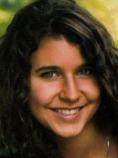

Major: Biology
Thesis Advisor: Caroline Goutte
Q: What is your thesis about?
A: My thesis involves studying a gene in the Notch signaling pathway, which is a method that cells use to communicate with each other during development and tissue regeneration. The pathway exists in almost all multicellular animals, including humans — problems with Notch genes have been linked to diseases ranging from cancer to Alzheimer’s to multiple sclerosis. Learning how the system works in people is difficult to do directly, so lots of laboratories, including mine, study how the genes work in simpler organisms. In my case, I work with nematodes, which are tiny worms (barely visible without a microscope) that share about 40 percent of their genes with humans. The gene I study seems to have a negative role in the pathway, meaning that it controls the amount of signaling going on and prevents it from going haywire. Even though nematodes can seem pretty remote from anything relevant to human health, uncontrolled cell signaling is the basic definition of cancer, which means that learning how it happens — and how it can be prevented — is at the root of a lot of medical research right now.
Q: How did this idea come about?
A: For a biology thesis, the process starts with all of the professors giving short presentations about their research, followed by a sort of “speed dating” period where you can meet with anyone whose topic interests you. I had taken a great class with Caroline Goutte last spring, and the idea of cellular communication appealed to me, so after our meeting I requested her as my advisor and was lucky enough to get my first choice. After reading several of her published papers, this gene — which Prof. Goutte discovered in a screen for new mutations several years ago — stood out to me, so we talked more and came up with a few broad questions that I might be able to answer over the course of the year. The project is constantly changing direction based on my results (and occasional lack thereof), so I’ll be as interested as anyone to see where it ends up in May.
Q: What are some low and high points right now?
A: It’s hard to describe the high points, because they all sound so small right now. The first time I sat down and watched a nematode embryo develop under the microscope was up there — I hadn’t fully believed my advisor when she told me that I would be able to track each division, watching one cell split into two then four and so on in the same predictable pattern, but it was true. Predicting which cells would express a Notch-related protein, then seeing those cells begin to glow green with a fluorescent marker, was weirdly and thoroughly satisfying… I hadn’t realized that any life form could be so organized. The low points are the times when the experiment doesn’t work, when even the control falls through. Yet whenever that’s happened to me so far, it hasn’t been long before we’ve realized that there might be a real explanation for it, one that could be interesting in itself. You don’t always find what you’re looking for, but if you’re really looking, you’ll find something.
Q: What advice do you have for students who are interested in writing a thesis?
A: I know that the thesis process is vastly different between departments, and the only common advice I have — probably the most common advice there is — is to choose a project that excites you from the start and that has enough substance to see you through the end of the year. I started to touch on this, but I think one of the most important things is that while you need a strong initial idea, you also need to be open to the idea of shifting in different directions. If I had come into this to prove one or two specific hypotheses, I would be mildly crushed right now, because the data so far hasn’t led where I expected. You need to be interested in the truth about your topic, more than in confirming your own suspicions. I realize that I won’t be getting anywhere near the full picture of this gene, but I’ve had a few interesting and repeatable results so far, and they’re completely new. No matter what you find, you’ll be the first one to have found it, and, for me at least, that’s something.